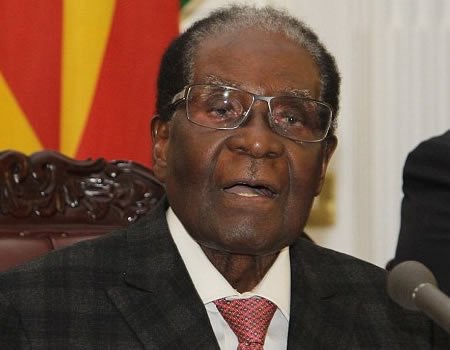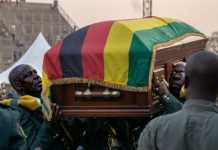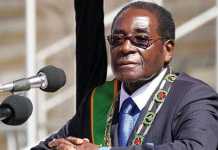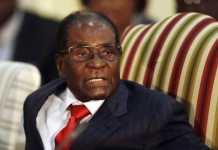
The recent demise of the former president of Zimbabwe, Robert Mugabe, is an opportunity for a deep reflection on the style of leadership on the continent of Africa, writes KUNLE ODEREMI.
THE African continent boasts of the unenviable record of having the longest-serving presidents and heads of state. From West Africa to Central Africa, down to Southern Africa and the Sahel region, the continent is dotted with sit-tight leaders, who have spent between 20 and 43 years in office. While some of them got to power through the barrel of the gun and later transmuted to civilian presidents after spending years as military dictators, other longest-serving African leaders came into office via the ballot box but, have refused to relinquish power, despite the wind of democracy blowing across the world.
The third category of the long-serving Africa leaders includes presidents that championed a revolutionary battle against despots who equated themselves to the sovereign ‘state’ as opposed to the convention of the people and their country. Another set of the sit-tight African leaders comprises the ones that led resistance against colonialism, with the collaborative effort culminating in achieving independence and the enthronement of civil rule in their countries. Ironically, late President Robert Gabriel Mugabe, fell into the last category.
On September 14, 2019, the former Zimbabwan ledarer until 2017 bid the world good bye following his demise in Singaporean hospital in Asia after a protracted illness. His remains were interred in Harare, the capital of the country amidst glowing tributes from mostly African leaders. A celebrated and cerebral elder statesman, who fought vigorously and led his country to independence from the British colonial masters in 1980, Mugabe was showered with flowery languages as an hero, icon and hero in a continent known for not just sit-tight leadership, but also for looting of the tilt, impunity of the highest order, diseases and ignorance borne out of illiteracy and criminal neglect of the citizenry by the political elite, Described as the ‘icon of liberation’ by his successor, President Emmerson Mnangagwa, Mugabe belonged to the generation of former President Kenneth Kaunda, of Zambia and fearless Bishop Desmond Tutu, who remonstrated againstracial segregation, minority rule and colonialism.
As a revolutionary, he was the voice of the people, the conscience of the nation and the hope of all generations at a time. But all these niceties were almost obliterated by the fact that he held on to power for 37 years, beginning from 1980 when his country became independence until he was eased out of office in a quasi-palace coup in 2017.
During his gradual rise to stardomand status of a statesman, Mugabe spit fire against imperialism. He was not cowed by the antics of the imperialists that forced him to seek hibernation outside the shoes of Rhodesia now Zimbabwe during the struggle for liberation. “Africa must revert to what it was before the imperialists divided it. These are artificial divisions which we, in our pan-African concept, will seek to remove,” he was quoted to have said in a speech he delivered in Salisbury in 1962. Salisbury was the name of the capital of the country during colonialism. In 1980, Mugabe promised an egalitarian society when he led his country to independence, with a plea to the white population of Zimbabwe, “Stay with us; please remain in this country and constitute a nation based on national unity.”
Today, he is no more, leaving scholars, especially historians to dissect his place in the annlas of his country, Africa and the human race. Whereas a significant number of his supporters, admirers and friends held him in high esteem and honour till he died, the preponderance of opinions on his life and times believed he rose to the status of a hero at the beginning but ended as a villain at the point of exit. The scars created by his almost four-decade rule left Zimbabwe hanging in the balance in all fronts of national development and economic progression. At a time he said: “Our economy is a hundred times better than the average African economy. Outside South Africa, what country is [as good as] Zimbabwe? What is lacking now are goods on the shelves – that is all.” This was contrary to the reality on ground about an economy that was almost in ruins because of his leadership style, coupled with his troubles with some global power blocs and influencers.
Nomarn Makoto, 33, a school teacher in Epworth,reflected the general mood of his countrymen when the demise of Mugabe was announced by the government. He said: “He has just died like everyone else. He left us in this mess and we are still suffering. The Bible says your deeds, good or bad, will follow you. His will surely haunt him on the other side.” Another citizen of the country, Netsai Gute, a 68-year-old retired civil servant, blamed the deceased for the precarious state of the nation’s economy, adding that Mugabe became a distant “godlike” figure who believed himself infallible and indispensable.“He was heartless … Everything that we fought for he threw in the mud. May God have mercy on his soul, because he left Zimbabwe worse off. My generation does not have a decent pension because of him, I cannot afford a decent burial because of him.”
In an attempt to give the impression of a semblance of democracy, most African leaders organise fraudulent elections designed to perpetuate themselves in office; tamper with constitution and deploy the coercive institutions of the state like the armed forces in order to retain power and further loot the treasury. The loot is stashed in foreign banks to boost the economy of developed countries.
With this as background, what are the inherent lessons for other African leaders from the death of the late Zimbabwean president?
Chief Mike Ozekhome (San)
The life and times of Zimbabwe’s Robert Mugabe present very interesting lessons for despotic, authoritarian, absolutist and dictatorial African leaders. That life is vanity upon vanity, all equals to vanity. That no leader transports to heaven or hell, when he dies, brute force, greed, avarice, power, money, influence, body guards, siren-blaring motorcade, property, wealth, women,mistresses, opulence, bootlickers, praiss-singers, etc.That a leader, like any other person, dies and leaves this world empty-handed, desolate, deserted, lonely, and as poor as a church rat, in the same poor state he had come into this world. He is buried alone six feet in the ground, forgotten by all, detested by the unfortunate recipients of his misgovernance, cursed by his traducers, or praised, euologised and canonised by all, if he governed well; that it is a leader’s positive impact on his people, especially the vulnerable, the poor, hapless and hopeless peasants,the rejected hoi-polloi and the denied and dejected Frantz Fanon’s Wretched of the Earth, that determine his place and space in history. Some are remembered for the vilest of historical misdeeds and misgovernance.Some are remembered for the greatest deeds of nobility.
Late President Mugabe, who had started well and zoomed into the consciousness of his people and the world from the latter angle, when he helped save his beleaguered people, ended up consigned into the ignoble pantheon and historical oblivion of the former. Such is life. Such are the lessons for our African leaders who play tin gods,who believe that their imperiousness and power inebriation will last forever. No, it will not! Power is like the vapour of the sky. It is apparent now and disappears the next moment. A word is enough for the wise. To say more will be otiose.
A legal practitioner, Mohammed Fawehinmi
The lessons from the life and times of the late President of the Zimbabwe, Robert Mugabe is that you should serve your people honestly and diligently. Don’t embezzle state funds like he did and like our own leaders do.
Comrade Wale Okunniyi
African leaders should simply learn from the Nelson Mandela model of political leadership and rule in South Africa. They should aspire to leave a popular enduring legacy for their countries than waiting to rule for self or a clique at all cost. They should be mindful that every political career is most likely to end in a disaster with time, especially when it is getting over-stretched.
Kindly contact us @ Naijalivetv@gmail.com
Call or Whatsapp: 07035262029, 07016666694, 08129340000




![Robert Mugabe’s casket worth 17billion …Family Members to watch his remains through their Mobile phone [PHOTOS]](https://www.naijalivetv.com/wp-content/uploads/2019/09/76A23AB1-B2C2-4FAC-AC74-7963EA03B321-218x150.jpeg)





